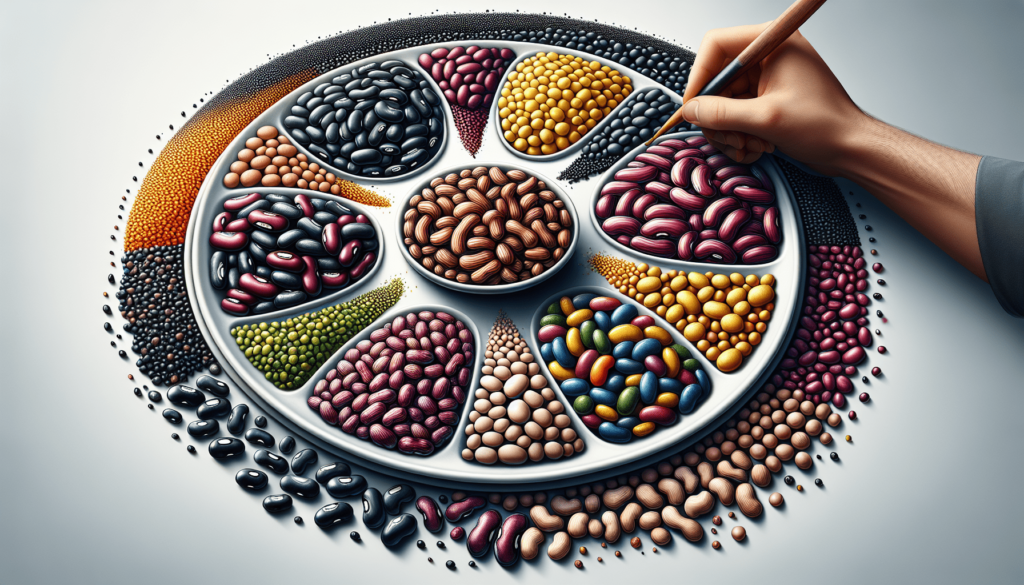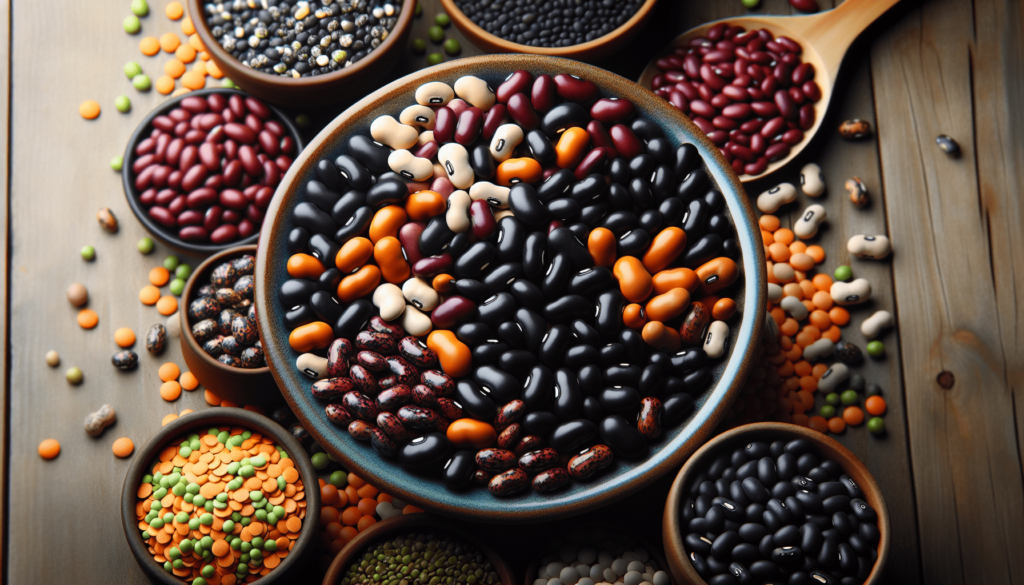In the realm of dietary choices, beans have long been recognized as a versatile staple that offers a myriad of health benefits. However, one question that often arises is whether consuming beans possesses any anti-inflammatory properties. Exploring this inquiry, we delve into the potential anti-inflammatory effects associated with the consumption of beans. From their nutrient-rich profile to their unique antioxidant components, beans present a tantalizing possibility for combating inflammation within the body. Join us as we uncover the truth behind the alleged anti-inflammatory properties of beans and uncover the potential they hold in promoting overall well-being.

Overview of Inflammation and Anti-Inflammatory Properties
What is inflammation?
Inflammation is a natural response of the body to protect itself from harmful stimuli, such as pathogens or tissue damage. It is a complex process that involves various immune cells and signaling pathways. While acute inflammation is a necessary defense mechanism, chronic inflammation can contribute to the development of numerous diseases, including cardiovascular disorders, obesity, diabetes, and certain types of cancer.
Importance of managing inflammation
Managing inflammation is crucial for maintaining overall health and reducing the risk of chronic diseases. While pharmaceutical interventions are available, incorporating anti-inflammatory foods into your diet can also play a significant role in combating inflammation.
Role of anti-inflammatory properties
Anti-inflammatory properties are substances or compounds that help reduce inflammation in the body. These properties can be found in various foods, including beans. Consuming beans, which are rich in antioxidants, fiber, and phytonutrients, has been associated with anti-inflammatory effects, making them a valuable addition to an anti-inflammatory diet.
Benefits of Beans in Reducing Inflammation
Nutritional profile of beans
Beans are a nutritional powerhouse, packed with several essential nutrients. They are an excellent source of protein, fiber, vitamins, and minerals, including folate, iron, magnesium, and potassium. This nutrient-dense profile makes beans a valuable addition to any diet.
Rich in antioxidants
Antioxidants are compounds that help protect the body from oxidative stress, a potential trigger for inflammation. Beans are known to contain a wide array of antioxidants, such as flavonoids, carotenoids, and phenolic acids. These antioxidants neutralize free radicals in the body and help reduce inflammation.
High in fiber content
Fiber is a crucial component of a healthy diet and plays a vital role in managing inflammation. Beans are an excellent source of dietary fiber, both soluble and insoluble. Soluble fiber forms a gel-like substance that slows down digestion, helping to stabilize blood sugar levels and reduce inflammation. Insoluble fiber adds bulk to the stool, promoting regular bowel movements and contributing to a healthy gut.
Low glycemic index
Consuming foods with a high glycemic index, such as refined carbohydrates, can lead to spikes in blood sugar levels and promote inflammation. However, beans have a low glycemic index, meaning they have a gradual impact on blood sugar levels. This makes beans a suitable choice for individuals looking to manage or prevent inflammation-related conditions like diabetes.
Contain phytonutrients
Phytonutrients, also known as plant compounds, have been shown to possess anti-inflammatory properties. Beans contain various phytonutrients like lignans and saponins, which have been linked to reduced inflammation and a lower risk of chronic diseases.
Specific Types of Beans and their Anti-Inflammatory Properties
Black beans
Black beans are not only a flavorful addition to meals, but they also offer several health benefits. They are rich in anthocyanins, a type of antioxidant that has been shown to have anti-inflammatory effects. Consuming black beans regularly may help reduce inflammation and promote overall health.
Kidney beans
Kidney beans are a popular choice of legumes and are packed with anti-inflammatory benefits. They are a great source of antioxidants, particularly flavonoids and anthocyanins. These compounds help combat oxidative stress and reduce inflammation in the body.
Pinto beans
Pinto beans have long been recognized for their nutritional value and anti-inflammatory properties. They are a good source of antioxidants, specifically kaempferol and quercetin, which have been shown to possess anti-inflammatory effects. Regular consumption of pinto beans may contribute to reduced inflammation and improved health.
Chickpeas
Chickpeas, also known as garbanzo beans, are a versatile legume with notable anti-inflammatory properties. They are rich in antioxidants, such as phenolic compounds and flavonoids, which have been associated with reduced inflammation. Adding chickpeas to your diet can be a delicious way to support your body’s inflammatory response.
Lentils
Lentils are not only a great source of plant-based protein but also offer anti-inflammatory benefits. They are rich in polyphenols, a type of antioxidant that helps reduce inflammation. The high fiber content of lentils also plays a role in managing inflammation by supporting a healthy gut.
Mechanisms of Action for Anti-Inflammatory Effects
Reducing pro-inflammatory markers
Beans contain compounds that can help reduce the production of pro-inflammatory markers in the body. These markers, such as cytokines and chemokines, play a significant role in promoting inflammation. The bioactive compounds in beans work to modulate the expression of these markers, leading to a reduction in inflammation.
Inhibiting inflammatory enzymes
Certain enzymes in the body are responsible for promoting inflammation. Beans contain compounds that can inhibit the activity of these enzymes, effectively reducing inflammation. By inhibiting the activity of enzymes like cyclooxygenase and lipoxygenase, beans help regulate the inflammatory response.
Blocking cytokines production
Cytokines are signaling molecules that regulate various immune responses, including inflammation. Beans have been shown to inhibit the production of pro-inflammatory cytokines, thus helping to suppress the inflammatory process in the body.
Modulation of gut microbiome
The gut microbiome plays a crucial role in immune function and inflammation. Beans, being rich in fiber, act as prebiotics and provide nourishment to the gut microbiota. By promoting a healthy gut microbiome, beans contribute to a reduced risk of inflammation and associated diseases.

Scientific Evidence Supporting Anti-Inflammatory Properties of Beans
Clinical studies on bean consumption
Numerous clinical studies have investigated the anti-inflammatory effects of consuming beans. These studies have consistently shown that regular bean consumption is associated with reduced levels of inflammatory markers in the body. Additionally, some studies have reported improvements in various inflammatory conditions, such as rheumatoid arthritis and inflammatory bowel disease, with increased bean intake.
Effect of beans on inflammatory diseases
Beans have been found to have a beneficial impact on inflammatory diseases, including cardiovascular disease, diabetes, and certain types of cancer. Regular consumption of beans has been associated with reduced risk or improved outcomes in these conditions, largely due to their anti-inflammatory properties.
Comparison with other anti-inflammatory foods
When comparing beans with other anti-inflammatory foods, they often come out on top. Beans offer a unique combination of nutrients, including antioxidants, fiber, and phytonutrients, that contribute to their potent anti-inflammatory effects. Incorporating a variety of beans into your diet can provide a broad spectrum of these beneficial compounds.
Incorporating Beans into an Anti-Inflammatory Diet
Recommended serving size
To maximize the anti-inflammatory benefits of beans, it is recommended to consume at least three to four servings per week. A serving typically consists of around 1/2 to 3/4 cup of cooked beans. When combined with other anti-inflammatory foods, such as fruits, vegetables, whole grains, and lean proteins, beans can contribute significantly to an anti-inflammatory diet.
Cooking methods for retaining nutrients
To retain the maximum amount of nutrients and antioxidants in beans, it is advisable to use cooking methods that minimize nutrient loss. Opt for methods like steaming, boiling, or pressure cooking, as these techniques help preserve the inherent anti-inflammatory properties of beans.
Pairing beans with other anti-inflammatory foods
To further enhance the anti-inflammatory effects of beans, consider pairing them with other foods known for their anti-inflammatory properties. This can include ingredients like leafy greens, tomatoes, olive oil, fatty fish, and nuts. Creating meals that combine these foods can provide a balanced and anti-inflammatory approach to your diet.
Considerations and Warnings
Individual sensitivities or allergies
While beans are generally well-tolerated, some individuals may have sensitivities or allergies to certain types of beans. It is essential to pay attention to your body’s response after consuming beans. If you experience adverse reactions such as bloating, gas, or digestive issues, it is recommended to consult a healthcare professional.
Phytic acid content and mineral absorption
Beans contain phytic acid, a compound that can inhibit the absorption of certain minerals, such as iron and zinc. Soaking and cooking beans can help reduce the phytic acid content and improve mineral bioavailability. If you have concerns about mineral absorption, discussing it with a healthcare provider or considering other dietary sources of these minerals may be beneficial.
Flatulence and digestive discomfort
Beans are notorious for causing flatulence and digestive discomfort in some individuals. This can be attributed to their high fiber content and certain complex sugars that are not fully digested. Gradually increasing your intake of beans and introducing them alongside other fiber-rich foods can help minimize these symptoms. Additionally, enzymatic products designed to aid digestion can be utilized if necessary.
Other Potential Health Benefits of Bean Consumption
Cardiovascular health
The anti-inflammatory properties of beans can have a positive impact on cardiovascular health. Regular bean consumption has been associated with improved lipid profiles, reduced blood pressure, and a lower risk of developing heart disease. Including beans in a heart-healthy diet can contribute to better overall cardiovascular health.
Weight management
Beans are a nutrient-dense food that can help with weight management. Their high fiber and protein content can promote feelings of fullness and help control appetite. Incorporating beans into your meals may help support healthy weight loss or weight maintenance.
Glycemic control
The low glycemic index of beans makes them an excellent choice for individuals looking to manage their blood sugar levels. Consuming beans as part of a balanced meal can help stabilize blood sugar and contribute to better glycemic control. This benefit is particularly important for individuals with diabetes or prediabetes.
Cancer prevention
Beans, with their rich antioxidant content, have been linked to a reduced risk of certain types of cancer. The antioxidants found in beans help protect cells from DNA damage and prevent the formation of cancerous cells. Regular consumption of beans as part of a well-rounded diet may contribute to a lower risk of developing cancer.
Conclusion
Incorporating beans into your diet can provide numerous benefits, specifically when it comes to managing inflammation. The rich nutritional profile of beans, coupled with their anti-inflammatory properties, make them an excellent addition to an anti-inflammatory diet. From reducing pro-inflammatory markers to blocking cytokines production, beans offer multiple mechanisms of action for reducing inflammation in the body. By regularly consuming beans and combining them with other anti-inflammatory foods, you can support your body’s inflammatory response and promote overall health. So next time you plan your meals, don’t forget to include a variety of beans for their tasty and anti-inflammatory benefits.
